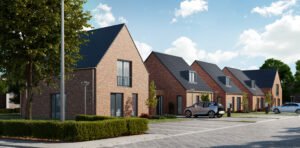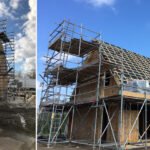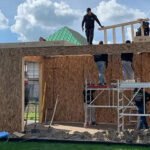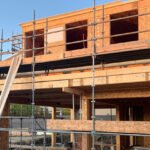
Project Showcase: Quacent SIP Applications in Resorts and Tiny Homes
Structural Insulated Panels (SIPs) are not limited to single-family homes or large-scale housing projects. Around Europe and beyond, SIPs are increasingly being used for resorts, holiday parks, and tiny homes—projects where speed, efficiency, and comfort are critical.
These sectors demand buildings that are quick to install, adaptable to different designs, and highly energy-efficient. Resorts need to minimize downtime while maximizing comfort for guests. Tiny homes require compact yet high-performing structures that support sustainable lifestyles. Quacent’s SIP technology delivers on all these needs, making it the ideal solution for both tourism and small-space living.
Why SIPs Are Perfect for Resorts
Hospitality projects, whether seaside resorts in Spain or mountain lodges in the Alps, require rapid delivery and consistent performance. Every day a unit is out of service represents lost revenue, so speed matters.
Key Advantages for Resorts:
- Fast Installation: SIP resort units can be assembled and made weather-tight in days.
- Minimal Disruption: Quiet, efficient assembly avoids disturbing guests at nearby facilities.
- Energy Efficiency: Lower heating and cooling demand reduces operational costs for resort operators.
- Guest Comfort: Excellent thermal and acoustic performance enhances guest experience.
Resorts increasingly use SIPs not just for speed, but for long-term savings and sustainability credentials that attract eco-conscious travelers.
Why SIPs Are Ideal for Tiny Homes
Tiny homes represent one of the fastest-growing trends in Europe, combining affordability, sustainability, and flexibility. These compact living solutions must maximize every square meter without compromising comfort.
Key Advantages for Tiny Homes:
- Slim, Insulated Walls: SIPs provide high insulation in thin profiles, maximizing usable interior space.
- Lightweight Construction: Perfect for relocatable or modular designs.
- Energy Savings: Even small heating or cooling systems are enough for SIP tiny homes, reducing operational costs.
- Design Flexibility: From rustic cabins to sleek urban designs, SIPs support diverse aesthetics.
For eco-villages and minimalist living movements, SIPs deliver comfort and sustainability in a compact form.
Case Examples
- Mediterranean Resort, Spain
A coastal eco-resort needed dozens of vacation units installed quickly to meet peak season demand. With SIPs:
- The shells of 30 units were completed in less than two months.
- Energy demand was reduced by nearly 40%, lowering operating costs.
- Guests reported high comfort levels, even in hot summer climates.
- Mountain Lodges, Austria
A lodge operator in the Austrian Alps required insulated cabins for year-round tourism. SIPs provided:
- High thermal performance for cold winters.
- Fast installation despite limited site access in mountainous terrain.
- Acoustic comfort, shielding guests from external noise.
- Tiny Homes, The Netherlands
A Dutch eco-village built 20 SIP tiny homes as part of a sustainable community.
- Slim walls maximized living space without sacrificing insulation.
- Prefabrication minimized disruption in a sensitive natural environment.
- Residents benefited from very low energy bills and a strong sense of community.
- Urban Tiny Houses, Belgium
In an urban infill project, SIPs were used for compact tiny homes designed for young professionals.
- Quick assembly reduced construction time in dense city areas.
- Units achieved high energy ratings, appealing to sustainability-focused buyers.
- Design flexibility allowed modern aesthetics that blended into the cityscape.
Operational Benefits for Owners
Both resorts and tiny home developers value SIPs not just during construction, but throughout the building lifecycle.
- Lower Operating Costs: Reduced heating/cooling loads save money year after year.
- Durability: SIPs resist mold, pests, and moisture—key for buildings exposed to varied climates.
- Sustainability: Eco-friendly branding boosts marketability for both resorts and tiny homes.
- Faster ROI: Quicker build times mean revenue streams start earlier.
Addressing Common Concerns
- “Prefab looks the same everywhere”: With SIPs, cladding and finishing options allow limitless design variation.
- “Tiny homes feel cramped”: Slim SIP walls create more usable floor space, improving comfort.
- “Resort buildings wear out quickly”: SIP durability ensures long-term performance, even under heavy guest use.
The Role of Quacent
Quacent supports resort operators and tiny home developers with:
- Ready-To-Assemble SIP Kits: Panels organized by construction phase, complete with fasteners.
- Design Assistance: BIM integration and detailing support for architects.
- Training & Supervision: Helping local crews assemble units quickly and correctly.
- Sustainability Compliance: EPDs and LCAs for projects requiring ESG reporting.
By providing more than panels, Quacent ensures that resort and tiny home projects succeed in both performance and profitability.
Looking Ahead
The popularity of SIPs in resorts and tiny homes is set to grow. With rising energy costs, traveler demand for sustainable accommodation, and growing interest in compact living, SIP technology is positioned as the go-to solution.
Future trends include:
- Eco-Tourism Expansion: SIP lodges and cabins for nature-based travel.
- Off-Grid Tiny Homes: Pairing SIP efficiency with solar and battery systems.
- Scalable Resort Models: Entire resort villages built with SIP prefab units.
- Urban Integration: Tiny homes as affordable housing solutions in European cities.
Conclusion
Resorts and tiny homes may be very different markets, but they share the same needs: fast installation, energy efficiency, comfort, and durability. SIPs deliver all of these benefits, making them a natural fit for both industries.
Quacent’s projects across Europe—from Spain’s resorts to Dutch eco-villages—demonstrate the versatility and reliability of SIP construction. For operators, developers, and homeowners, SIPs are not just a building solution—they are the foundation for sustainable, profitable, and comfortable living.






Add a comment